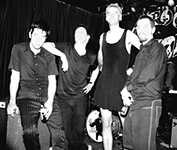

What is it that separates Pansy Division from the vast field of mediocre punk bands and earns them a loyal cult following? Several answers to this question suggested themselves when Pansy Division played with Wedge at Cleveland's Grog Shop on Sept. 24.
Cleveland-based Wedge provided a fine model of the mediocre playing that might be best described as aging punk robbed of its energy and resigned to a state of apathetic angst. It came as no surprise after the show when bass player Jim Flynn listed the Sex Pistols and "70s music" as influences.

Many of their songs took the familiar form of rock ballads, dealing with such topics as a couple who joined hands and flung themselves down a flight of stairs ("Raise Your Hand If You're Bitter"). While these songs were well-crafted and at times catchy, they were severely lacking in novelty and enthusiasm. These shortcomings became particularly clear in a cover of the Supremes' "You Keep Me Hangin' On," which seemed to keep draggin' on interminably.
Also, there was the little matter of image, or lack thereof. As Flynn bluntly and accurately put it, "We have no image." This may not be a problem in some kinds of music, but it is a relatively big issue in the world of punk, and particularly in the sub-genre of queer-punk. Watching Wedge, one might well be left wondering, "I think they're a queer-punk band, but why does the singer keep sticking the word 'she' into songs?" (Flynn later explained, "We throw that gender shit around.")
Wedge's level of excitement was reflected by the crowd's response, which consisted largely of sitting on the floor and occasionally clapping.
In fairness, many of the accusations made of Wedge could be applied to Pansy Division as well: They have relatively formulaic songs, rock ballads and 80s pop covers ("Pretty Boy" is Pansy Division's cover of the Depeche Mode song "What's Your Name"). However, Pansy Division also possess a certain je ne sais quoi which sets them apart from the relatively monotonous world of punk bands.
For one thing, Pansy Division does have an image, and it goes beyond the artificial flowers with which they decorate their amps. As one of the seminal bands in the queer-punk movement, they have always been very conscious of their identity and its impact.
According to lead singer and guitarist Jon Ginoli, "[O]ne of the things that Pansy Division set out to stamp out [was] ambiguity as a substitute for honesty." With songs as blatantly honest as "Femme in a Black Leather Jacket" and "I'm Gonna be a Slut" spicing up their set, ambiguity hardly seemed to be a problem.
In addition to this sense of identity, Pansy Division's stage presence contributes greatly to their appeal. At the Grog Shop, they seemed to take naturally to the role of entertainers, for example when bass player Chris Freeman ran off-stage and returned in a white vintage dress which left his hairy legs exposed, prompting Ginoli to remark, "It's like Mary Tyler Moore meets the Sailor's Union Hall." This playful, irreverent dynamic dominated most of the set.
There was also a clear rapport between the band and their loyal fans. The sing-a-long contingent was out in full force, particularly during the song "Luv Luv Luv" the chorus of which was punctuated with shouts of "Sex! Sex! Sex!" Pansy Division instilled energy into the audience, compelling people get up off the floor and even (in some rare instances) dance.
Pansy Division is currently touring in support of their new album Absurd Pop Song Romance on Lookout Records, and on their tour next spring, they again plan to pass through Ohio.
Pansies: The true predecessors to the Backstreets, Pansy division played in Cleveland earlier this week. (photo by Kurt Beals)
Copyright © 1998, The Oberlin Review.
Volume 127, Number 5, October 2, 1998
Contact us with your comments and suggestions.